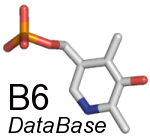|
|
| type |
Journal Article |
| authors |
Li, N.; Parsons, B. L.; Liu, D. R.; Mattoo, A. K. |
| title |
Accumulation of wound-inducible ACC synthase transcript in tomato fruit is inhibited by salicylic acid and polyamines |
| journal |
Plant Mol Biol |
| Activity |
4.4.1.14 |
| Family |
4.4.1.14 |
| ui |
Awisttf |
| year |
(1992) |
| volume |
18 |
| number |
3 |
| pages |
477-87 |
| | |
|---|
| keywords |
Base Sequence |
| abstract |
Regulation of wound-inducible 1-aminocyclopropane-1-carboxylic acid (ACC) synthase expression was studied in tomato fruit (Lycopersicon esculentum cv. Pik-Red). A 70 base oligonucleotide probe homologous to published ACC synthase cDNA sequences was successfully used to identify and analyze regulation of a wound-inducible transcript. The 1.8 kb ACC synthase transcript increased upon wounding the fruit as well as during fruit ripening. Salicylic acid, an inhibitor of wound-responsive genes in tomato, inhibited the wound-induced accumulation of the ACC synthase transcript. Further, polyamines (putrescine, spermidine and spermine) that have anti-senescence properties and have been shown to inhibit the development of ACC synthase activity, inhibited the accumulation of the wound-inducible ACC synthase transcript. The inhibition by spermine was greater than that caused by putrescine or spermidine. The transcript level of a wound-repressible glycine-rich protein gene and that of the constitutively expressed rRNA were not affected as markedly by either salicylic acid or polyamines. These data suggest that salicylic acid and polyamines may specifically regulate ethylene biosynthesis at the level of ACC synthase transcript accumulation. |
| last changed |
2008/04/25 17:36 |
|











